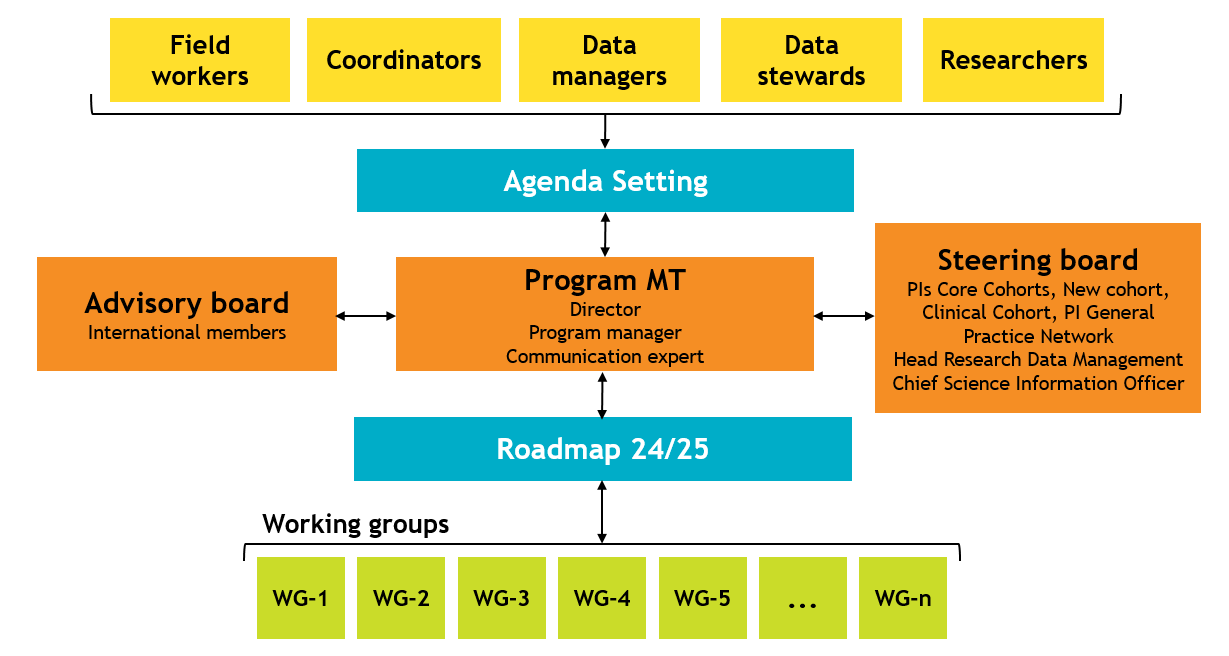Our motto:
Connecting data, improving health
Management team
Cécile Boot, interim director
Emiel Hoogendijk, project manager
GeertjeMarije Takkenberg, communications officer
Contact: cohorthub@amsterdamumc.nl
Background
Amsterdam UMC, VU Amsterdam and UvA faculties maintain numerous longitudinal cohort studies. These offer a wealth of health data and contribute significantly to scientific output and to evidence-based policymaking. Cohort studies, therefore, have a profound scientific and societal impact. In contrast, their infrastructure is highly vulnerable with a lack of structural funding, decentralized modus operandi, and knowledge sharing and collaboration could be improved. It is this discrepancy that brought Amsterdam UMC to establish the Amsterdam Cohort Hub to strengthen the sustainability of our cohort studies.
Building blocks
Amsterdam Cohort Hub receives great support from cohort staff, who actively contribute to the working groups and communities and dedicate significant time and effort to strengthening the collaboration between the cohort studies teaming up under the ACH umbrella (see figure below).
 Cohort studies teaming up under the ACH umbrella
Cohort studies teaming up under the ACH umbrella
Roadmap 2024-2025
To guide our efforts, we drafted a roadmap, describing our efforts between September 2024 and December 2025. This can be downloaded here.
In this roadmap, we identify six key action areas for ACH:
 Our 6 areas of action
Our 6 areas of action
- Encouraging systematic and inspiring knowledge sharing, collective learning, and joint innovation and research among cohort professionals.
- Creating a data platform and standardized procedures to archive FAIR data, maintain the quality of the data, present it in a data catalog, and facilitate data linkage.
- Securing dedicated cohort support in data services, ethics, legal, ICT, biobanking, and research methods in collaboration with the support units.
- Promoting data reuse by showcase studies, easy and harmonized data access procedures, and a single-entry point to access data for researchers.
- Executing lobby and PR activities to strengthen the reputation of our studies, expand their impact, and secure funding.
- Developing national and international partnerships to foster inter-organizational data harmonization and open-source data standards and management.
Our organization structure
Altogether, about 75 people are involved in the development of the Amsterdam Cohort Hub and the reinforcement of our cohort infrastructure. During the first phase of ACH's existence, the project organization evolved into a more concrete structure, and the roles of the different entities became more clearly defined (see picture below). ACH consists of a Program MT, an advisory board. a sterring board, communities and working groups.

Our communities
We use community building for the empowerment of the professionals engaged in cohort studies. We distinguish five roles within each cohort study. These are the fieldworkers, the data stewards, the data managers, the coordinators and the researchers.
For each role a community is established, where the representatives from different cohorts frequently meet, exchange experiences and set collective standards based on best practices.
Our working groups
Additional focused action comes from our working groups, composed of participants with diverse expertise and from different cohort studies. These groups work on a variety of issues assigned by our steering committee.
Steering committee
The steering committee of the Amsterdam Cohort Hub (ACH) - comprised of the PI's of some of the major cohort studies and data experts – is responsible for overseeing the full program and has some dedicated tasks itself. These include:
- Developing a governance for the ACH infrastructure
- Creating a mission, vision and narrative for the ACH
- Exploring a joint data access policy
- Selecting a joint ACH-spokesperson
- Developing a fundraising and advocacy policy
Advisory board
An Advisory Board will convene three times a year to support us with advice and this will provide an opportunity to collaborate. The following esteemed (inter)national colleagues, who have experience with similar efforts such as consortia, take place in our Board:
- Professor Louise Arsenault, King's College London & Landscaping International Longitudinal Datasets project
- Dr Tom Emery, Erasmus University Rotterdam & ODISSEI
- Professor Laura Fratiglioni, Karolinska Institutet & NEAR
- Professor Arfan Ikram, Erasmus Medical Center & ZonMW
- Professor Miranda Schram, Maastricht UMC+ & Netherlands Cohort Consortium
- Dr Ruben Kok, Health-RI & Dutch Techcentre for Life Sciences
- Professor Jennifer Symond, University College London & CLOSER
- Professor Wim Timens, UMCG Cohort and Biobank Coordination Hub
- Professor Elio Riboli, Imperial College London & European Prospective Investigation into Cancer and Nutrition (EPIC)
Studies involved
At this moment, the following cohort studies are participating in the Amsterdam Cohort Hub. The program is open to welcoming other cohorts. We are currently working on a set of inclusion criteria for the participating cohort studies.
- ABCD cohort study: The Amsterdam Born Children and their Development cohort is a multi-ethnic birth study, which follows the health, growth and development of approximately 8,000 children born in Amsterdam. See: ABCD study website(in Dutch).
- HELIUS cohort study: The Healthy Life in an Urban Setting study is a prospective cohort study on health and healthcare among an urban multi-ethnic population, investigating the biological, psychological and social causes of the unequal burden of disease across ethnic groups. See: HELIUS cohort study website(in Dutch, English and Turkish).
- The Hoorn DCS Cohort: A population-based cohort including almost all people with type 2 diabetes in a primary care setting in the West-Friesland area of the Netherlands, investigate the course of development and progression of diabetes. See: Hoorn studies cohort website.
- The Hoorn Studies: Designed to investigate the course of development and progression of diabetes over a period of several years in the general public. See: Hoorn studies cohort website.
- LASA cohort study: The Longitudinal Aging Study Amsterdam is a prospective cohort study of older adults in the Netherlands (55–84 years). The focus is on the determinants, trajectories and consequences of physical, cognitive, emotional and social functioning. See: LASA cohort study website.
- Netherlands Twin Register: A national register in which twins, multiples and their parents, siblings, spouses and other family members participate and contributes to gene discovery, causality modeling, and studies of genetic and cultural inheritance. See:NTRwebsite.
- NESDA cohort study: The Netherlands Study of Depression and Anxiety is designed to investigate the course of depression and anxiety disorders, in particular their psychological, social, biological and genetic factors. See: NESDA cohort study website
- NESDO cohort study: The Netherlands Study of Depression in Older persons examines the determinants, the course and the consequences of depressive disorders in older persons and to compare these with those of depression earlier in adulthood. See:NESDO cohort study website(in Dutch).
- NOCDA cohort study: The Netherlands Obsessive Compulsive Disorder Association study is a multicenter naturalistic cohort study of the biological, psychological and social determinants of chronicity in a clinical OCD patients sample. See: NOCDA cohort study website(in Dutch).
- NL-SH cohort study: The Netherlands Longitudinal Study on Hearing examines the relationship between hearing impairment and several aspects of life in adults aged between 18 and 70 years. See:NL-SH cohort study website(in Dutch).
- RODAM cohort study: The Research on Obesity and Diabetes among African Migrants study investigates the reasons for the high prevalence of cardiovascular diseases and risk factors among sub-Saharan Africans in diaspora. See: RODAM cohort study website.
- ADC: The Amsterdam Dementia Cohort is a patient cohort that consists of patients that are referred to the Alzheimer Center Amsterdam and includes neuropsychological information, MRI scan results and EEG. See: study website (in Dutch).
- Amsterdam MS cohort: The cohort started over 20 years ago and included 5000 patients with MS. Every five years a subset of these participants are invited for additional measurements, such as neurological tests, cognition tests, eye movement tests and MRI. See: study website (in Dutch).
- ANHA: The Academic Network of General Practice Amsterdam UMC-database contains longitudinal routine care data of patients in the participating general practices from Amsterdam, Diemen-Zuid, Haarlem and Almere, and can conditionally be used for research and quality of care purposes and be linked to other cohort data for enrichment. See: study website (in Dutch).
- NET-QUBIC: The Netherlands Quality of life and Biomedical Cohort is a multi-center longitudinal cohort in which head and neck cancer patients and their informal caregivers were followed , to advance research optimizing diagnosis, treatment, and supportive care for head and neck cancer patients and their informal caregivers. See: study website (in Dutch).
- NAR: Netherlands Autism Register: a longitudinal register, including approximately 6.800 participants. The NAR maps the differences and similarities among autistic individuals and utilizes this data for purposes such as advocacy. Within the NAR, we conduct our research in co-creation with autistic individuals. See: NAR website (in Dutch, English and Turkish)
- NMCB: Netherlands ME/CFS Cohort and Biobank. A national, patient-focused, 8-year funded research consortium led by Amsterdam UMC, studying ME/CFS, post-COVID, and post-Lyme syndromes. It collects clinical, biological, and neuroimaging data to uncover disease mechanisms and biomarkers, supporting research on diagnosis and treatment. See: NMCB study website
- Generation2: Generation2 is an ongoing cohort study since 2009, explores parenting and mental health development. This year, Generation2Connect launches alongside it, aiming to enhance adaptation to pregnancy, postpartum, and parenthood through an inclusive, family-centered approach. By leveraging digital advancements and interdisciplinary interventions, the study addresses the specific (mental) health and parenting needs of (future) parents and care providers. See: : Generaties² | Generaties2 (in Dutch).
- The ENIGI (European Network for the Investigation of Gender Incongruence) study is a
multicenter prospective cohort study designed to investigate the effects and
side-effects of hormonal treatment in trans people. See: ENIGI study – The European Network for the Investigation of Gender Incongruence.
Who is who at ACH
Participating staff members
- Ancion, L.F. (Lauren)
- Angelakis, A. (Athanasios)
- Beune, E.J.A.J. (Erik)
- Blom, M.T. (Marieke)
- Boer, C. de (Casper)
- Brouwer, C.D. (Cyrina)
- Chilunga, F.P. (Felix)
- Dieduksman, S.R. (Sara)
- Düren, T. (Tessa)
- Eekelen, R. van (Rik)
- Eikelenboom, M. (Merijn)
- Galenkamp - van der Ploeg, H. (Henrike)
- Geerlings, M.I. (Mirjam)
- Groeneveld, L. (Lenka)
- Haaster, A. van (Aimée-Claire)
- Hoogendijk, E.O. (Emiel)
- Horsfall, M. (Melany)
- Horst, M.H.L. van der (Marleen)
- Jansen, F. (Femke)
- Jansen, L.A. (Lotte)
- Kersloot, M.G. (Martijn)
- Koopman, A.D.M. (Anitra)
- Lamers, F. (Femke)
- Lieshout, N. van (Noekie)
- Ligthart, R.S.L. (Lannie)
- Linden, E.L. van der (Eva)
- Lunansky, G. (Gaby)
- Mossel, R. van (Roland)
- Muilwijk, M. (Mirthe)
- Olislagers, Q. (Quint)
- Peyrot, W.J. (Wouter)
- Plijner, L.G. (Lucca)
- Poppelaars, J.L. (Jan)
- Remmelzwaal, S. (Sharon)
- Riemsma, S. (Sanne)
- Rutters, F. (Femke)
- Schijndel, R.A. van (Ronald)
- Strijbis, E.M.M. (Eva)
- Takkenberg, G.M. (Geertje Marije)
- Tijms, B.M. (Betty)
- Twait, E.L. (Emma)
- Viegas Calçada, D.I. (Dulce)
- Visser, G.R. (Gerben Rienk)
- Vlainic, E. (Elize)
- Weverling, A.S. (Anouk)
- Wier, M.F. van (Marieke)
- Zandbelt, T.V. (Tim)
- Zwan, J.E. van der (Esi)
Steering Committee
- Bartels, M. (Meike)
- Beulens, J. (Joline)
- Boot, C.R.L. (Cécile) (interim director)
- Flier, W. van der (Wiesje)
- Geerlings, M.I. (Mirjam)
- Heijer, M. den (Martin)
- Huisman, M.A. (Martijn)
- Leth, F.C.M. van (Frank)
- Penninx, B. (Brenda)
- Scholte, R.A. (Rudy)
Management team
- Cécile Boot, interim director
- Emiel Hoogendijk, project manager
- GeertjeMarije Takkenberg, communications officer
Contact: cohorthub@amsterdamumc.nl
Amsterdam Cohort Hub webinars
Every four weeks, ACH organizes a webinar to present our cohort-studies and discuss themes relevant for cohort studies, their staff and researchers. You can find more information and the webinar schedule on this page: Amsterdam Cohort Hub webinars are coming up! (amsterdamumc.org).
Articles about Amsterdam Cohort Hub
Emiel Hoogendijk new project manager Amsterdam Cohort Hub (amsterdamumc.org)
Amsterdam Cohort Hub celebrates 1-year anniversary with impressive results (amsterdamumc.org)
Amsterdam Cohort Hub webinars are coming up! (amsterdamumc.org)
Recap 1st Annual Cohort Conference Amsterdam
New milestone for Amsterdam Cohort Hub
Amsterdam Cohort Hub: Connecting data, researchers and cohorts
Socials
Visit the ACH LinkedIn webpage.

